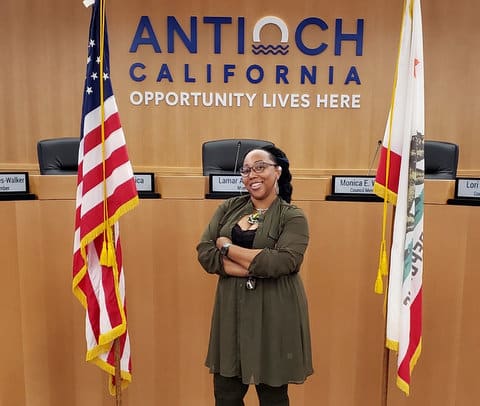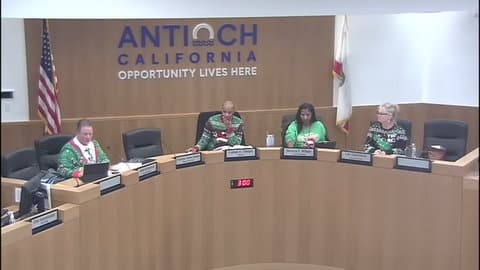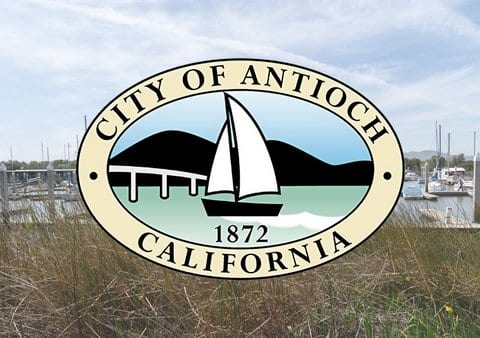
06 Nov Tamisha Torres-Walker Speaks to Street Soldiers Radio About UN Address

Antioch City Council member Tamisha Torres-Walker was invited to speak before the United Nations Human Rights Council last month. (Campaign photo via tamishaforantioch.com)
Interview, Dr. Joseph Marshall
Editors’ note: Tamisha Torres Walker, mayor pro tem of the city of Antioch, recently traveled to Geneva for the 54th session of the United Nations’ Human Rights Council where she was invited to speak about policing issues and her work with the Safe Return Project, of which she is executive director.
She spoke with host Dr. Joseph Marshall and the “Street Soldiers Radio” team Oct. 8 on 106.1 KMEL radio about her experience.
Below is a transcribed portion of that radio program, which has been edited lightly for clarity.
Street Soldiers Radio: Wow, speaking to the United Nations. How did this all come about?
Tamisha Torres Walker: I was invited by an organization called Edfu. They wanted to see how they could help us when they heard all the stories about policing and what’s been going on in Antioch. There were two reports being released. One was done by the United Nations High Commissioner for Human Rights and the other was done by the International Independent Expert Mechanism to Advance Racial Justice and Equality in the Context of Law Enforcement.
SSR: Let’s go back to the moment when you got the invitation to the United Nations, what do you think? Did you think it was fake?
TTW: I didn’t know what to think because I didn’t know what the United Nations did. A gentlemen by the name of Sheldon (Williams, president and CEO of) the Edfu Foundation, just moved to Pittsburg, and he was hearing everything that was going on in Antioch. He joined a couple of meetings with different foundations and philanthropy and then reached out to myself and James [Herard] from Lift Up Contra Costa. Everyone’s like, I want to hear more about your story. And I think I could help y’all get some help and bring this to like a global platform.
When he posed the invitation to come to the 54th human rights session at the United Nations, I didn’t know what to think, [but] I was like, sure, Why not?
I was really nervous and just decided to bring my best self as I could like to the conversation with local context, but with an argument for the civil rights of Black people and descendants of enslaved folks here in the U.S. around law enforcement.
It was amazing. I met a lot of people. Through an organization called UNARC (U.N. Anti-Racism Coalition) I found out that Black people from around the world when George Floyd was murdered, mobilized, and I didn’t know that. And they brought the case of George Floyd to the United Nations and said something needs to be done. And they fought for many years to make sure that police use of force and brutality of African folks in the U.S. was on the world stage.
Getting to hear the story of how people are fighting for other Black folks globally but also us here in America really inspired me. I heard stories of freedom fighters in Brazil, Black people who are having their land grabbed, and how police are a central tool of taking these folks’ land and how they are afraid, but they fight anyway. It was just so amazing to hear all of these stories from Black folks around the world who are saying, we’re freedom fighters, and we deserve to not have to face state-sanctioned violence, to keep our land, to keep our lives and our freedom. It was just so amazing.
SSR: That is unbelievable. [As you’re talking], I’m thinking back to when we first met, right when you started Safe Return and started working with brothers and sisters getting out of jail and trying to get to them.
TTW: Yeah, it’s amazing. They cut me off, but when you have to make a verbal statement, you have to submit it written into record. And so when people go on this global website, the United Nations Human Rights Council site, the statement I made is there. It’s in the record; it’s a part of history.
Because the real push was like, look, we can have civilian peacemakers. Policing isn’t the only mechanism for public safety.
>>> Q&A: Torres-Walker Wants to Keep ‘Expanding Our Ideas Around Public Safety’
Hear Torres-Walker’s full statement to the U.N. council:
UN_HumanRightsCouncil-TamishaTorres-Walker from Communications Manager on Vimeo.
SSR: Can you tell us about the substance of your remarks or your recommendations to the U.N. when it comes to policing in Antioch and throughout the United States?
TTW: Both reports had community engagement and vast recommendations on what needs to happen with policing in the U.S. to protect Black folks. There’s a U.S. visit report that we haven’t received yet, which also names over 100 people who’ve been victims of police.
I expressed how I appreciated the recommendations in the report. I highlighted the importance of civilian oversight over policing. And I use that point in the report not just to highlight civilian oversight, but also to say that the most important thing to keep our community safe isn’t policing or hyper-surveillance.
What we really need is a deep investment in civilian-led programs that really get at the root and address harm in the community before it even happens.
The last part of my statement was really sad, finding out that the Los Angeles Police Department budget was $3.2 billion and climbing. Can you imagine what organizations like Alive & Free or the Office of Neighborhood Safety in Richmond — models that really help people heal and advance our communities to prevent harm — could do with $3.2 billion annually? So my recommendation towards the end was to really look at how Los Angeles Police Department’s budget is the size of a developing country’s military. That is not an investment, and people are preventing harm.
My hope is that my comments will make it to leaders here in the U.S., and be more intentional about how we invest in community-led and community-based solutions to prevent harm in communities that are solely based on policing.
SSR: We always say to young people, if you don’t like what people are doing, you got to have a seat in the room, right? Because if not, these people are going to make laws about you anyway, so you better be in the room to make sure they do it. You need to have a seat in the room to say no, that’s not correct.
TTW: Not just laws, Doc, but also narratives. On my way back, I had to brace myself for the negative report about this visit by all the haters, but it really is just ignorance.
“Did she tell them that she was a convicted felon? Does she tell that she had a criminal record?” Like, just all of these things? And one person was like, “How can a felon get a passport?” You know what I mean? All the narratives that are misinformed.
Narratives that challenge your person could still make their way into public policy and harm our communities. So I’m hoping that this means something for us locally.
I was actually invited to come back and I’m excited about that. I also got to meet an elected official from Geneva, a Black woman, and she was like, we need to stay connected. So we could fight keep fighting for Black people globally. And I’m hoping when she comes to the U.S. that we can get her to come to the Bay Area, It was really powerful, for me anyway, to see all these Black folks globally saying, we were standing globally for Black folks. I’m just hoping that it means something for us here in the U.S.
SSR: Speaking of haters, I know when you were first elected to City Council in Antioch, you had your fair share, based on just who you are, and your positions on policing issues. Some people were upset and didn’t like the things you had to say or didn’t even like you being there in the first place. Lo and behold, a couple years later, we find out all this dirt about police in Antioch from the FBI investigation. I’m wondering, how has that revelation changed things for you in the city? Do people now have a better understanding of why the things you’re talking about are so important?
TTW: I believe some people do. And I think you know, even more people of color, have come forward to tell their stories. And like the police department was meant to police people who weren’t supposed to be in Antioch. Right. And so a lot of us were called crazy and gaslit and made to feel like our stories weren’t true. And it couldn’t be their beloved police department. And it turned out it was, and like, I’m being blamed, the mayor is being blamed, Monica Wilson, all the Black people on the council are being blamed for the devastation of this police department.
There has been all this diversion from actually settling in to the truth and figuring out what is the reconciliation and reparations moving forward? Because this didn’t just happen. This has been allowed to happen. And even people are saying we want the old police chief back. It happened under his leadership.
My heart is hoping that this isn’t the majority speaking, because if it is, we are in trouble. We’re in a lot of trouble in this city.
I know that the police department is working really hard to rebuild its ranks. But what we as a community need to do is work hard to get deep investment in solutions, different solutions that actually prevent crime in the community and not just respond to it.





No Comments